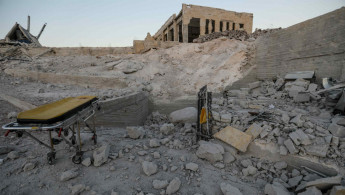Two-thirds of UN Security Council plead for investigation into bombardment of Idlib hospitals
The United Nations Security Council on Tuesday called for an investigation into the bombing of hospitals in northwest Syria.
More than 23 hospitals have been destroyed or damaged by airstrikes since the Syrian regime and its Russian ally began an assault in late April to retake the opposition-held bastion of Idlib.
Diplomats representing two-thirds of the Security Council told UN Secretary General Antonio Guterres that at least 14 UN-supported hospitals on a list of deconflicted facilities have been hit since April.
Hospitals on the UN's deconfliction list shared their coordinates with Russia in order to safeguard the facilities from airstrikes.
Activists say, rather than protecting medical facilities, the list has rendered hospitals more easy to target.
Speaking to reporters after briefing the Security Council for the seventh time since the Idlib offensive began, UN aid chief Mark Lowcock questioned whether the coordinates had been used to target healthcare facilities.
The Security Council has long been deadlocked over serious action against the Syrian regime due to Russia and China's power of veto in the body.
The UK, France, the US, Germany, Belgium, Peru, Poland, Kuwait, Dominican Republic and Indonesia - collectively representing two-thirds of the council - on Tuesday delivered a demarche, or formal diplomatic petition, to the secretary general questioning the lack of an inquiry into attacks on UN-supported facilities.
The approved request, seen by Reuters, asks for an internal UN investigation into the bombing of UN-supported hospitals.
Guterres' spokesman Farhan Haq confirmed the group had met with the secretary general and told Reuters their request would be considered.
The representatives of ten member states had noted that former Secretary General Ban-Ki Moon had used his discretionary powers in 2016 to launch an investigation into an attack on a Syrian Arab Red Crescent humanitarian convoy in Aleppo.
They also asked Guterres to investigate why the deconfliction mechanism had failed to shield hospitals from attack.
Russia and the Syrian regime counter claim they are not targeting any civilians or civilian infrastructure and that the damaged hospitals have been taken "out of commission… by terrorist groups". These reports have been rubbished by NGOs and activist groups.
Such hospitals, Syrian UN Ambassador Bashar Jaafari said earlier this month, "no longer serve their original purpose and cannot be considered hospitals, health-care centres or even 'civilian objects' under humanitarian law".
British UN Ambassador Karen Pierce told the Security Council on Tuesday that Jaafari's comments amounted to an admission to attacks on hospitals - a war crime that "deserves the utmost, deep investigation".
The opposition bastion is home to around 3 million civilians - more than half of whom fled to the province from Syrian and Russian bombardment elsewhere in the country.
Those civilians have borne the brunt of the new offensive, with more than 700 killed and 400,000 displaced since late April. Crowded marketplaces, civilian homes and water plants have also been targeted.





 Follow the Middle East's top stories in English at The New Arab on Google News
Follow the Middle East's top stories in English at The New Arab on Google News
![The UAE is widely suspected of arming the RSF militia [Getty]](/sites/default/files/styles/image_330x185/public/2024-11/GettyImages-472529908.jpg?h=69f2b9d0&itok=Yauw3YTG)
![Netanyahu furiously denounced the ICC [Getty]](/sites/default/files/styles/image_330x185/public/2024-11/GettyImages-2169352575.jpg?h=199d8c1f&itok=-vRiruf5)
![Both Hamas and the Palestinian Authority welcomed the ICC arrest warrants [Getty]](/sites/default/files/styles/image_330x185/public/2024-11/GettyImages-2178351173.jpg?h=199d8c1f&itok=TV858iVg)